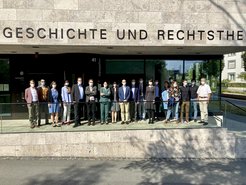How to historicise the ‘independence wars’ in the European Union:
Conference to launch the new Max Planck Law Fellow Group with Antoine Vauchez
The concept of ‘independence’ occupies a central but contested role in the recent European debate, which seems to have reached its temporary peak with the current disputes over the rise of populism, the European rule of law mechanism and the expansion of the European Central Bank’s (ECB) monetary policy mandate. A good opportunity, therefore, to take stock from a historical and sociological perspective. This is the declared objective of the new Max Planck Law Fellow Group Independence and Democracy in the European Union, which was officially launched under the leadership of Professors Antoine Vauchez (Université Paris 1-Sorbonne), Armin von Bogdandy (Max Planck Institute for Comparative Public Law and International Law, Heidelberg) and Stefan Vogenauer (mpilhlt, Frankfurt) with a conference at the Frankfurt Max Planck Institute for Legal History and Theory on 14 September 2021.

In his opening address, Antoine Vauchez explained how the concept of ‘independence’ initially governed the autonomy of national jurisdictions before becoming increasingly associated with the rise and role of supranational institutions such as the European Court of Justice and the ECB in the course of European integration. According to Vauchez, one must historicise the legal disputes associated with this development – the European ‘independence wars’ – and subject them to a socio-legal analysis in order to understand which commonalities and differences characterise legitimising references to ‘independence’. The twenty participants from various European countries, which included not only members from the partner institutions of the Max Planck Law Fellow Group but also colleagues from Florence (EUI) and Goethe University (Frankfurt), subsequently discussed further relevant case studies, necessary sectoral or national differentiations of the discourse on independence as well as the possible methodological foundations of the project. The lively discussion highlighted the interdisciplinary and transnational potential of the new ‘Independence and Democracy’ research group and its relevance for the current challenges of the European Union.
